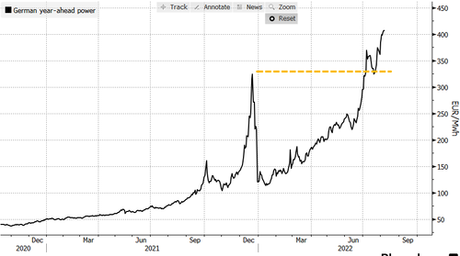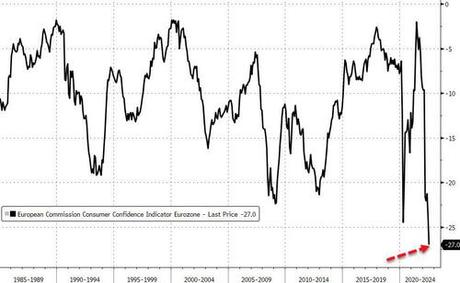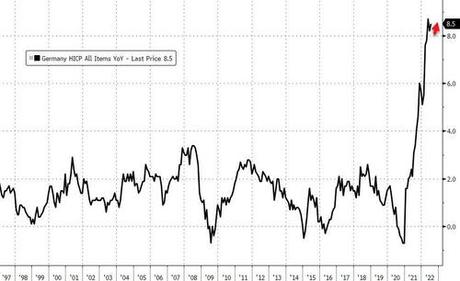A new report published by the Employment Research (IAB) on Tuesday outlines how Germany's economy will lose a whopping 260 billion euros ($265 billion) in added value by the end of the decade due to high energy prices sparked by Russia's invasion of Ukraine which will have severe ramifications on the labor market, according to Reuters.
IAB said Germany's price-adjusted GDP could be 1.7% lower in 2023, with approximately 240,000 job losses, adding labor market turmoil could last through 2026. It expects the labor market will begin rehealing by 2030 with 60,000 job additions.
The report pointed out the hospitality industry will be one of the biggest losers in the coming downturn that the coronavirus pandemic has already hit. Consumers who have seen their purchasing power collapse due to negative real wage growth as the highest inflation in decades runs rampant through the economy will reduce spending.
IAB said energy-intensive industries, such as chemical and metal industries, will be significantly affected by soaring power prices.
In one scenario, IAB said if energy prices, already up 160%, were to double again, Germany's economic output would crater by nearly 4% than it would have without energy supply disruptions from Russia. Under this assumption, 660,000 fewer people would be employed after three years and still 60,000 fewer in 2030.
This week alone, German power prices hit record highs as a heat wave increased demand, putting pressure on energy supplies ahead of winter.

Rising power costs are putting German households in economic misery as economic sentiment across the euro-area economy tumbled to a new record low. What happens in Germany tends to spread to the rest of the EU.

There are concerns that a sharp weakening of growth in Germany could trigger stagflation as German inflation unexpectedly re-accelerated in July, with EU-Harmonized CPI rising 8.5% YoY.

Germany is facing an unprecedented energy crisis as Russian natural gas cuts via the Nord Stream 1 pipeline will reverse the prosperity many have been accustomed to as the largest economy in Europe.
"We are facing the biggest crisis the country has ever had. We have to be honest and say: First of all, we will lose the prosperity that we have had for years," Rainer Dulger, head of the Confederation of German Employers' Associations, warned last month.
Besides Dulger, Economy Minister Robert Habeck warned of a "catastrophic winter" ahead over Russian NatGas cut fears.
Other officials and experts forecast bankruptcies, inflation, and energy rationing this winter that could unleash a tsunami of shockwaves across the German economy.
Yasmin Fahimi, the head of the German Federation of Trade Unions, warned last month:
"Because of the NatGas bottlenecks, entire industries are in danger of permanently collapsing: aluminum, glass, the chemical industry."
IAB's report appears to be on point as the German economy seems to be diving head first into an economic crisis. Much of this could've been prevented, but Europe and the US have been so adamant about slapping Russia with sanctions that have embarrassingly backfired.

